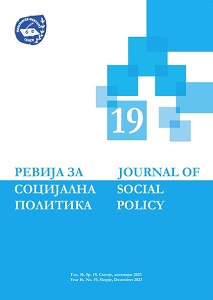From a Demographic Trend to a Policy Problem: The Framing of Low Fertility by Pronatalist Governments in North Macedonia (2009) and Serbia (2018; 2022)
From a Demographic Trend to a Policy Problem: The Framing of Low Fertility by Pronatalist Governments in North Macedonia (2009) and Serbia (2018; 2022)
Author(s): Kristijan FidanovskiSubject(s): Governance, Welfare systems, Social development, Demography and human biology, Sociology of Politics
Published by: Филозофскиот факултет во Скопје
Keywords: low fertility; pronatalism; politics of ideas; identity politics; frame analysis; North Macedonia; Serbia;
Summary/Abstract: This paper examines the government discourses around low fertility in North Macedonia (2009) and Serbia (2018; 2022), which have introduced some of the most generous (relative to income) pronatalist child benefit packages in modern European history. Contributing to the literature on the politics of ideas around demographic processes and identity politics more broadly, we examine the transformation of low fertility into a policy problem through four discursive frames: (1) socioeconomic; (2) patriotic; (3) ethnic; (4) moral. Using the Frame Analysis method, we assess the construction of these frames through the techniques of “frame amplification,” “frame bridging,” “frame extension,” and “frame transformation”. We examine 58 pieces of pronatalist government discourse derived from parliamentary debates, government press conferences and TV campaigns around the introduction and (in the case of Serbia) expansion of the support packages. We find considerable evidence of socioeconomic and (especially) patriotic and moral framing of low fertility in both countries, but we only find evidence of ethnic framing in Serbia. We suggest that the presence of the socioeconomic, patriotic, and moral frames in both countries might be due to the confluence of demographic decline, contested nation-building, and conservative ideology of ruling parties and (a majority of) citizens. We also argue that the dominance of the patriotic and moral frames in both countries suggests that their pronatalism is more rooted in identity politics than in demographic realities. Finally, we posit that the divergence on the ethnic frame might be attributable to differences in party competition and interethnic relations.
Journal: Ревија за социјална политика
- Issue Year: 2023
- Issue No: 19
- Page Range: 5-31
- Page Count: 27
- Language: English

